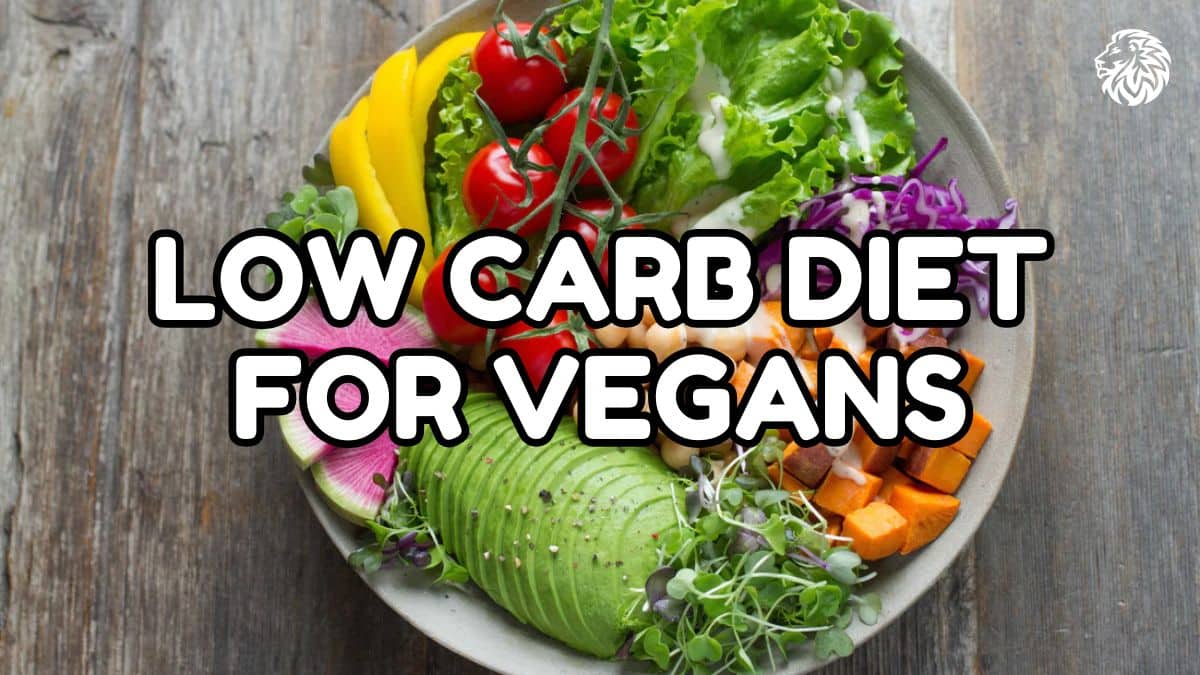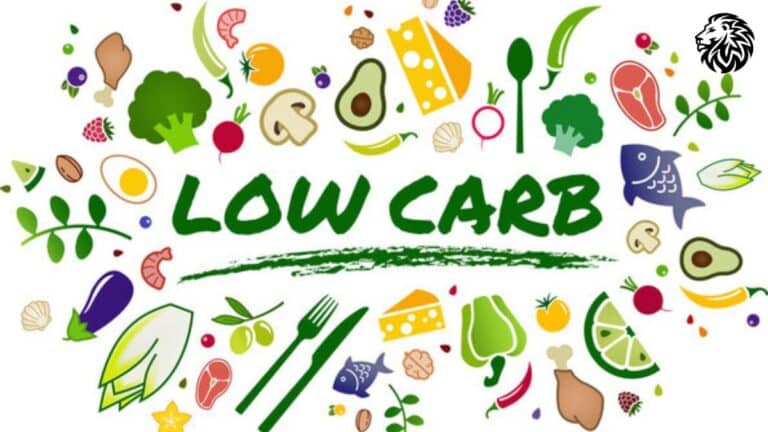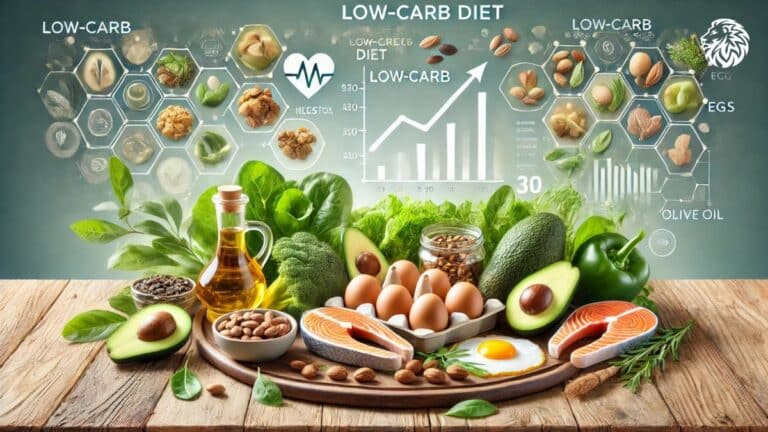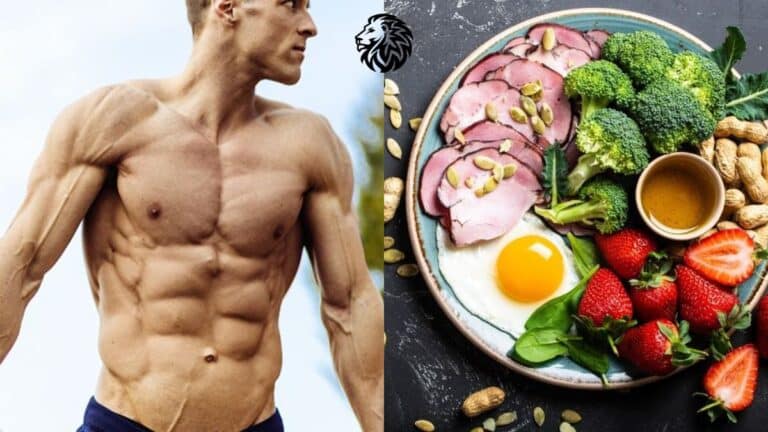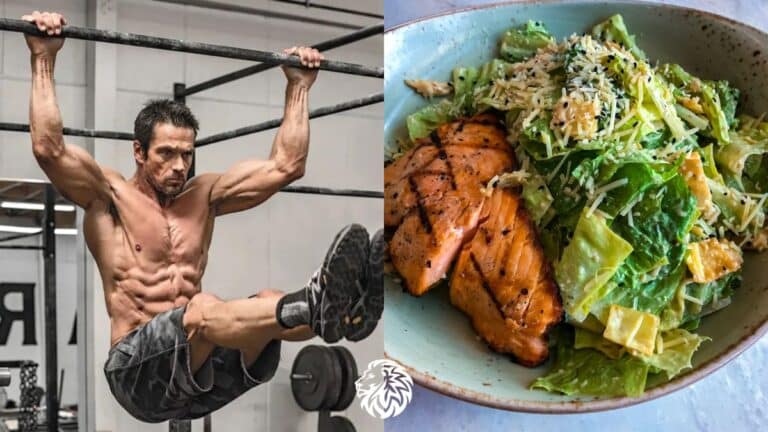Understanding Low-Carb Vegan Diets
Basics of a Low-Carb Vegan Diet
Thinking about mixing the best of the veggie world with low-carb living? You’ve landed in the right spot. A low-carb vegan diet means saying goodbye to meat and dairy while keeping your carbs in check. Sounds a bit like juggling, right? But it’s doable! Focus on plant-powered proteins, veggies that don’t come loaded with starch, and fats that don’t feel guilty (we’re talking avocados and nuts!). Say “see ya” to those pesky high-carb foods like grains and sugars—your waistline will hug you for it.
Your everyday low-carb munching generally aims for less than a quarter of your calories from carbs. For a 2,000-calorie diet, that’s fewer than 130 grams (Healthline). We all know vegans like a challenge, so aim for 100-150 grams. Use a nutrition tracker to play carb detective. Find where your protein and fats are coming from—just make sure they’re team plants!
Benefits and Challenges
Jumping on the low-carb vegan train could mean a ticket to a healthier you. Studies shout about vegans having a whopping 75% lower chance of high blood pressure and a slimmer risk of type 2 diabetes to the tune of 78%. Plus, ditching the meat can add up to losing more than 5 pounds compared to meat-eating folks after just a few months (Healthline). With low-carb tricks, you could also give blood sugar spikes a run for their money, making life easier for those battling diabetes or insulin woes (low carb diet and diabetes).
Now, here’s the catch. Dropping the carbs while keeping it vegan needs some menu magic. You’ve got to chow down wisely to stay balanced. And, of course, there’s the good and the tricky bits:
| Cool Stuff | Tough Stuff |
|---|---|
| Lower chance of high blood pressure | Hard to avoid high-carb plant stuff |
| Less risk of diabetes | Meal planning gymnastics |
| Possible slimming down | Protein can play hard to get |
| Better blood sugar handling | May need a vitamin boost |
To score all the goodness and beat the tough bits, go for non-starchy veggies and fruits that won’t mess with your glycemic index. Snack smart with low carb snacks, and remember to fuel up with enough plant protein and good fats alongside your meals. Want more on meal crafting? Check our ideas on a low carb diet menu.
With a little foodie wisdom and a dash of prep work, you’re on your way to nailing a low-carb vegan diet that supports everything from your health to feeling snug in your favorite jeans. For more tips and some culinary wizardry, wander through our pieces on low carb recipes and low carb diet benefits.
Essential Nutrients for Vegans
Vitamin B12
Y’all ever feel like you’re trying to find a needle in a haystack when it comes to B12 as a vegan? This vitamin’s a big deal—think nerve function, DNA production, and hangin’ with red blood cells. With meat off the menu, you gotta hustle a bit more to get your B12 fix since it’s mostly in animal goodies.
According to the wise folks at Healthline, adults need around 2.4 mcg a day to keep things ticking over smoothly. You can hit that target by munching on B12-fortified foods or popping a supplement. Feast your eyes on B12 sources that won’t let ya down:
| Source | Vitamin B12 Content (mcg) |
|---|---|
| Nutritional Yeast (1 tbsp) | 2.4 |
| Fortified Plant Milk (1 cup) | 2 |
| Fortified Breakfast Cereal (1 serving) | 1.5-2 |
For a treasure trove of tips, don’t miss our write-up about low carb diet benefits.
Vitamin D
Them bones and your immune system? They’re big fans of Vitamin D. Seems like it’s MIA in most plant eats, which makes sense why vegans often run short on it. Sunbathing is fabulous for gettin’ your D fix, but what about those gloomy winter days?
The smart cats at Healthline suggest checking your blood levels and maybe adding a Vitamin D2 or vegan Vitamin D3 supplement into your routine. Here’s a snack of Vitamin D sources that won’t leave ya hangin’:
| Source | Vitamin D Content (IU) |
|---|---|
| Fortified Orange Juice (1 cup) | 100 |
| Fortified Plant Milk (1 cup) | 100 |
| Mushrooms exposed to UV light (1 cup) | 100-200 |
Got more curiosities? Our guide on low carb meal plan might just be your cup o’ tea.
Omega-3 Fatty Acids
Who needs Cupid’s arrow when you got Omega-3 for your heart and brain? Vegans often find it tricky to get their Omega-3s since fish ain’t an option.
To meet the daily ballpark of 200-300 mg, algae oil’s your ally (Healthline). Chia seeds, flaxseeds, and walnuts are also squad goals as they provide ALA, which transforms into the hero forms, EPA and DHA, in algae oil. Check out the Omega-3 squad:
| Source | Omega-3 Content (mg) |
|---|---|
| Chia Seeds (1 oz) | 5,060 |
| Flaxseeds (1 tbsp) | 2,350 |
| Walnuts (1 oz) | 2,570 |
Running this nutrient marathon helps keep you fly on a low-carb diet for vegans. Always think about getting professional medical advice to find what works best for you diet-wise.
Plant-Based Powerhouses
Grabbing enough protein on a low-carb diet for vegans is vital if you want to keep your muscles happy and your health in check. Let’s chew over why protein is a big deal and discover some top-notch eats for your vegan lifestyle.
The Buzz About Protein
Think of protein like the handyman of your body—it repairs tissues, builds up your defenses, and makes those tiny, life-saving enzymes. If you’re vegan and watching your carbs, hitting the right amount of protein can feel like trying to find a needle in a haystack, but don’t worry, it’s totally doable. Plus, protein’s a magic bullet for feeling full longer, which is useful if you’re working on that low-carb diet for weight loss.
Eateries That Pack a Punch
There’s a whole smorgasbord of plant-based goodness packed with protein that’s perfect for a low-carb vegan diet. Let’s pull up a chair and look at some key players:
- Soy Superstars
- Tofu
- Edamame
- Tempeh
- Miso
Soy wins the gold medal for being a complete protein and is great at mimicking the meat vibes. Plus, it’s packed with all those goodies like nutrients and antioxidants (Top Nutrition Coaching).
| Soy Product | Protein (g per 100g) | Net Carbs (g per 100g) |
|---|---|---|
| Tofu | 8 | 2 |
| Edamame | 11 | 3 |
| Tempeh | 19 | 6 |
| Miso | 12 | 8 |
- Nutty and Nice
- Hemp Seeds
- Chia Seeds
- Pumpkin Seeds
These little fellas are essentials in a low-carb vegan world, offering complete proteins and a good splash of omega-3s along with some handy vitamins and minerals (Top Nutrition Coaching).
| Food | Protein (g per 100g) | Net Carbs (g per 100g) |
|---|---|---|
| Hemp Seeds | 31 | 2.5 |
| Chia Seeds | 17 | 2 |
| Pumpkin Seeds | 19 | 5 |
- Mushroom Magic
- Shiitake
- White
- Cremini
- Portobello
- Oyster
Mushrooms are the low-carb champions bursting with protein and more. They’re ace at stepping in for meat, keeping your vegan vibe strong (Top Nutrition Coaching).
| Mushroom | Protein (g per 1 oz) | Net Carbs (g per 1 oz) |
|---|---|---|
| Shiitake | 0.5 | 1 |
| White | 1 | 1 |
| Cremini | 1 | 1 |
| Portobello | 1 | 1 |
| Oyster | 1 | 1 |
- Powdered Perfection
- Pumpkin Seed Protein
- Hemp Protein
- Chia Seed Protein
- Flax Seed Protein
- Pea Protein
Need a protein punch but don’t have time to cook? Plant-based powders are here to save the day, helping you reach those protein goals without any fuss (Medical News Today).
Spice up your meals and meet your protein quota by including these powerhouse foods in your diet. They’ve got your back whether you’re keeping things lean and green, or aiming to shed a pound or two. Curious about how a low-carb life can boost you up? Check out our piece on low-carb diet benefits to get more tasty tidbits.
Low-Carb Options for Vegans
So, you’ve decided to jump on the low-carb train but wanna stick to vegan choices, huh? High five! Here are some top picks that won’t make you miss the carbs, focusing on tasty veggies and fruits that keep your blood sugar levels happy.
Non-Starchy Vegetables
Non-starchy vegetables are your new best buddies. They’re like the cool kids at the party—low on carbs and calories but packed with vitamins and minerals. Plus, they make your tummy feel full without being a bore! Think kale, broccoli, and parsley, all jazzing up your plate.
| Non-Starchy Vegetable | Carbs per 100g |
|---|---|
| Spinach | 3.6g |
| Kale | 4.4g |
| Broccoli | 6.6g |
| Cauliflower | 5g |
| Zucchini | 3.1g |
| Bell Peppers | 6g |
Mix these veggies into your meals, and you won’t even remember you’ve gone low-carb. It’s like magic, only greener. Need meal ideas? Heck, check out our low-carb recipe section for some mouth-watering inspiration.
Low-Glycemic Fruits
Got a sweet tooth? Hey, no problem. Low-glycemic fruits are where it’s at. They keep you from spiraling into a sugar frenzy while adding zest to your diet. Berries, grapefruits, and tangy green apples are some rockstars here.
| Low-Glycemic Fruit | Glycemic Index (GI) | Carbs per 100g |
|---|---|---|
| Strawberries | 40 | 7.7g |
| Blueberries | 53 | 14.5g |
| Raspberries | 30 | 11.9g |
| Grapefruit | 25 | 8.5g |
| Green Apple | 39 | 13.8g |
Toss these fruits in a bowl or take ’em on the go. Sweet cravings will be a thing of the past! Wanna plan better? Our meal plan tips got you covered like a warm blanket.
By bringing in non-starchy veggies and low-glycemic fruits to your low-carb vegan groove, you’re on your way to tasty town without derailing the carb budget. Dig deeper into our tips with guides on the benefits of low-carb diets and some snack ideas too.
Incorporating Healthy Fats
You know those things they call “good fats”? Yeah, they’re not just some diet jargon. They’re your best buddies if you’re tackling a low-carb diet without chewing on meat or dairy. These fats don’t just fill you up; they’re like the unsung heroes keeping your body humming along nicely.
Sources of Healthy Fats
Finding the right sources of these fats while cutting carbs isn’t as tricky as it sounds. You’ve got some real power players in the kitchen, like:
- Nuts and Seeds: Ever grabbed a handful of almonds or sprinkled chia seeds over your oatmeal? Congrats, you’ve hit the jackpot of fats, protein, and fiber!
- Avocado: This is nature’s butter! Loaded with healthy fats, fiber, and there’s a bunch of vitamins hiding in there as well.
- Coconut Oil: It’s not just about tropical vibes; this oil gives quick energy and some funky name fats that are actually good for you.
- Olive Oil: A classic choice! Drizzle it over your salad or use it to sauté veggies to get a dose of those heart-loving fats.
Here’s a quick look at how these foods pack in the fat:
| Food Item | Fat Content (per 1 oz) |
|---|---|
| Almonds | 14g |
| Walnuts | 18g |
| Chia Seeds | 9g |
| Flaxseeds | 8g |
| Hemp Seeds | 15g |
| Avocado (1/2 medium) | 15g |
| Coconut Oil (1 tbsp) | 14g |
| Olive Oil (1 tbsp) | 14g |
Get some variety in there! Mixing up these fats into your meals makes your diet all kinds of colorful and nutritious. Check out this guide on a low carb meal plan.
Benefits of Omega-3s
Omega-3 fatty acids are like the superheroes of the fat world—they’re essential, which means you’ve got to get them from what you eat. They do wonders for your heart, brain, and just about everything else.
Sources of Omega-3s for Vegans
Lucky for you, there are plenty of ways to get your omega-3 fix without a trip to the fish market:
- Chia Seeds: These tiny seeds pack a big punch when it comes to omega-3s.
- Flaxseeds: Another great source, ground them up and sprinkle on everything!
- Hemp Seeds: They’ve got a great balance of omega-3 to omega-6 fats.
- Walnuts: The perfect crunchy snack that’s doing your heart a favor.
These plant-based sources fit perfectly with your low-carb, vegan lifestyle. Feel the omega-3 love with benefits like these:
- Heart Health: Lower blood pressure and a smaller chance of saying “hello” to heart disease.
- Brain Function: They support your brain so you can remember where you left your keys.
- Inflammation Reduction: Chronic inflammation ain’t got nothing on these fats.
For more tips on keeping those omega-3 levels up, check our guide on low carb diet and cholesterol.
Stick with these healthy fats and omega-3s, and your low-carb vegan diet will not only be healthier but also pretty satisfying. You’ll crush your weight loss goals while feasting on delicious meals. For more tasty stuff, check out our article on best low carb foods.
Planning a Balanced Low-Carb Vegan Diet
Going on a low-carb diet while staying true to your vegan roots might seem a bit of a puzzle, but don’t worry; everything fits together. Just like piecing together a jigsaw, preparation is your best friend. Hang out here for some handy-dandy advice to get all those nutrients in while keeping it plant-based.
Meal Planning Tips
Wanna rock a low carb diet for vegans? You gotta think ahead to make sure you’re grabbing all those important vitamins and nutrients. Here’s your cheat sheet to kick things off:
- Mix It Up: Pump up your plate with a colorful mix of low-carb veggies like spinach, kale, broccoli, asparagus, and zucchini. Each one’s a little powerhouse of vitamins, minerals, and all that good stuff.
- Protein, Please: Tofu, tempeh, and seitan are your protein pals. Beans and legumes are in the club, too. Peek at our best low carb foods for more protein-packed ideas.
- Good Fats = Good Times: Avocados, nuts, seeds, and olive oil are where it’s at. They’ll keep you satisfied and give you those important fatty acids.
- Fruit Lowdown: Grab fruits that won’t send your blood sugar on a roller-coaster ride. Berries are your sweet buddies here.
- Prep Like a Pro: Prepping meals ahead makes life easier and keeps those high-carb temptations at bay. Hop over to our low carb meal plan for some cooking inspiration.
Here’s a peek at what a balanced low-carb vegan day could look like:
| Meal | Example |
|---|---|
| Breakfast | Spinach and avocado smoothie with a sprinkle of chia seeds |
| Lunch | Stir-fried tofu with broccoli, green beans, and a side of leafy greens |
| Snack | Handful of almonds or a small serving of hummus with cucumber sticks |
| Dinner | Cauliflower rice with tempeh, sautéed with bell peppers and onions |
Supplement Considerations
Keeping it low-carb and vegan can sometimes leave your plate missing a few stars from the nutrition hall of fame. So, here’s the lineup of supplements you might want to think about:
- Vitamin B12: Your go-to for keeping your nerves and blood in check, usually found in animal products. According to Healthline, aim for 2.4 mcg every day.
- Vitamin D: Got sunshine? If not, a little Vitamin D might help for bone strength and calcium absorption.
- Omega-3s: Brain food alert! Get your dose of omega-3s from algae oil for those EPA and DHA fatty acids.
- Calcium: Strong bones need calcium. If it’s missing from your meals, fortified foods or supplements can fill the gap.
| Supplement | Recommended Daily Intake |
|---|---|
| Vitamin B12 | 2.4 mcg |
| Vitamin D | 600 IU (15 mcg) |
| Omega-3 Fatty Acids (EPA/DHA) | 250-500 mg |
| Calcium | 1000 mg |
Make sure you’re grabbing those necessary vitamins and minerals, as Healthline suggests, to skip any nutritional gaps.
For more behind-the-scenes details and low-carb vegan life hacks, you can peek at our low carb recipes section. Balancing your plate lets you soak up the sweet benefits of a low carb diet without missing a beat on nutrition.
